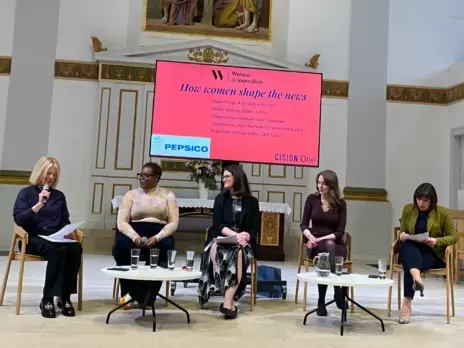
The Financial Times reporter who went undercover to expose alleged sexual harassment at the Presidents Club charity dinner has said a “nasty backlash” to the story led to her retreating to the countryside for a week.
Madison Marriage, the FT’s accounting and tax correspondent, said she “desperately hopes” the increased violence against journalists seen across the European Union in the past year does not make its way to the UK.
Four journalists have been killed in Europe since August 2017, when Danish inventor Peter Madsen murdered Swedish freelance Kim Wall who was interviewing him on a submarine trip. He has been jailed for life.
Speaking at Women in Journalism’s How to Break a Big Story panel at Wiggin LLP law firm in London last night, Marriage revealed how “harrowing and upsetting” it had been to receive trolling online, hate mail in the post and abusive phone calls following the Presidents Club story.
Marriage said it was “impossible” to keep up with her Twitter feed in the first few days after publication because of the volume of tweets and messages she was receiving.
She was soon advised not to answer her phone “because colleagues had received abusive calls which were intended for me”.
She said she received security advice following serious concerns about some of the threats towards her, adding: “Then I was basically told to take a week off and go into the countryside. I disappeared for a week.”
Marriage said she began checking the pictures of the trolls who were making threats and taking screenshots, saying: “I wanted to know who they were if they came up to me in the street.”
“I was more worried than I should have been,” she said.
“I don’t think anyone was going to come and murder me in the street but I was really paranoid, running around James Bond-style with my back to the wall and in hindsight I was silly but I was genuinely scared.”
Marriage said she had sought advice from a colleague used to reporting internationally from war-torn countries, asking him if she should consider installing extra locks and burglar alarms.
She said he told her: “Madison, since World War Two not a single journalist has died on European soil, no European journalist has died because of their reporting on European soil,” Marriage said.
[Update 3/4/24: It has been pointed out to us that this advice was incorrect, journalists have been killed in Europe since World War Two as a result of their reporting, including Martin O’Hagan in Northern Ireland in 2001]“And since then there have been horrific atrocities and all three of them made my blood run cold and I desperately hope we don’t have that situation in the UK. It’s three in one year and it’s no coincidence.”
On Saturday, Bulgarian TV reporter Viktoria Marinova, who had been investigating the possible misuse of EU funds, was found dead after being brutally raped and murdered. Police have not ruled out the possiblity that her death was linked to her work as a journalist.
Slovak investigative journalist Jan Kuciak was shot dead in February this year in Slovakia while investigative journalist Daphne Caruana Galizia was killed by a car bomb in October 2017 near her home in Malta.
The FT has now introduced a strategy to deal with any stories which may elicit a similar backlash for reporters, such as Marriage’s story going behind the scenes of ad boss Martin Sorrell’s departure from WPP.
About two hours before that story’s publication in June, Marriage said, an email was sent to the newsroom from management warning staff it was happening and advising on how to deal with any calls that may come in.
She said the FT as an organisation had been “naive” ahead of publishing the Presidents Club scoop, which took Marriage off her usual beat, and were “completely unprepared for the nasty backlash and that was very harrowing and upsetting”.
“I think we grew up a bit as a paper,” she said of the backlash.
“We write difficult, complicated, controversial financial stories, but we haven’t done anything that’s kicking the dirt in the eyes of our readers and upsetting powerful people and people on Twitter like white male trolls.
“That was kind of shell-shocking so now I think if people are ever going to do anything similar we would have a strategy.”
Carole Cadwalladr, who won the Orwell Prize for Journalism this year for her investigation into alleged Facebook data harvesting by UK firm Cambridge Analytica, also spoke on the panel about the misogynist abuse she has received during the past two years.
The peak, Cadwalladr said, came in November when the Leave.EU campaign – one of the subjects of her investigation – photoshopped her face into a clip from the film Airplane of a “hysterical” woman being told to calm down and repeatedly slapped and then shot and then shared it on Twitter.
“I was in my kitchen like ‘what’s this, is this meant to be funny’? That isn’t funny, that’s abusive and needs to be reported,” Cadwalladr said.
She added that she was left thinking “if something happens to me” the video had acted as an incitement to violence.
“Allowing it to stay up was opening the door to more violence against women, more violence against journalists.”
Twitter did not take the video down, despite it being flagged multiple times.
Cadwalladr added: “I still kind of feel quite emotional about it now because it was unacceptable…
“You’ve got to draw the line somewhere and I feel as a society this is what the entire [data harvesting] story is about. We have to hold that line and call the companies to account and we couldn’t hold Twitter to account then.”
Guardian reporter Amelia Gentleman, Daily Telegraph investigations reporter Sophie Barnes (formerly of Inside Housing) and Abbie Fielding Smith, international editor at the Bureau of Investigative Journalism, also spoke on the panel, which was chaired by Sunday Times Magazine editor Eleanor Mills.
Picture: Tolga Akmen/Financial Times
Email pged@pressgazette.co.uk to point out mistakes, provide story tips or send in a letter for publication on our "Letters Page" blog






